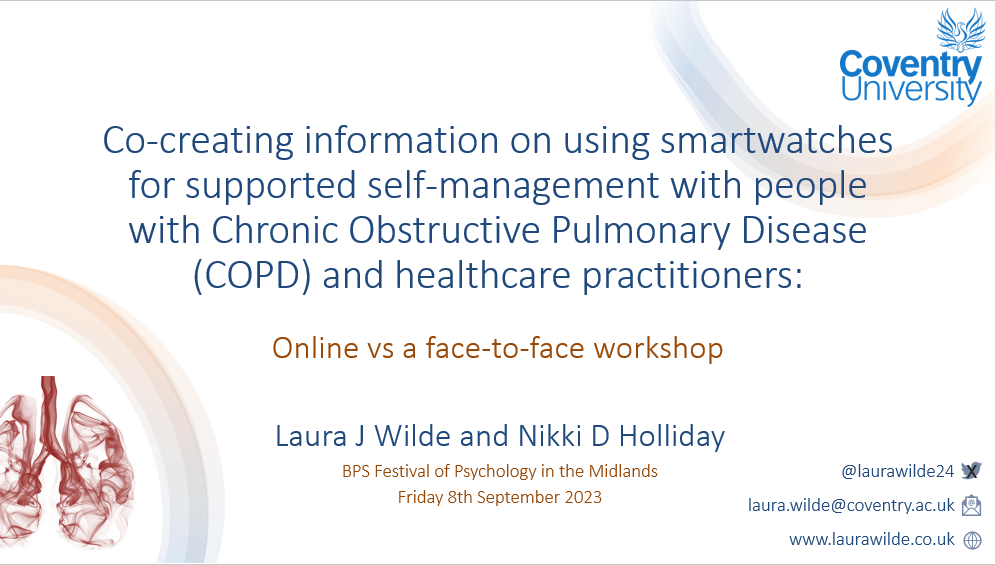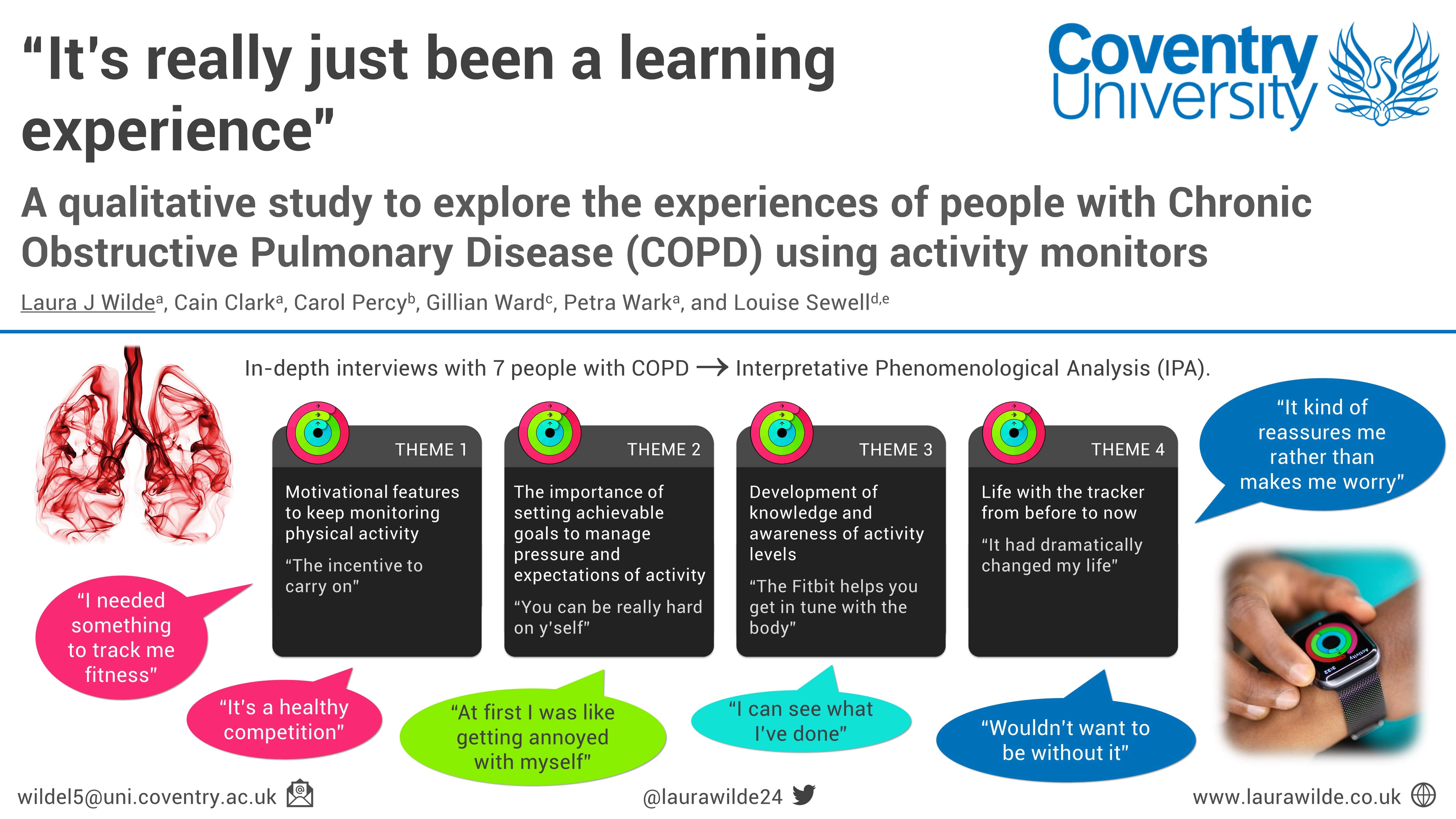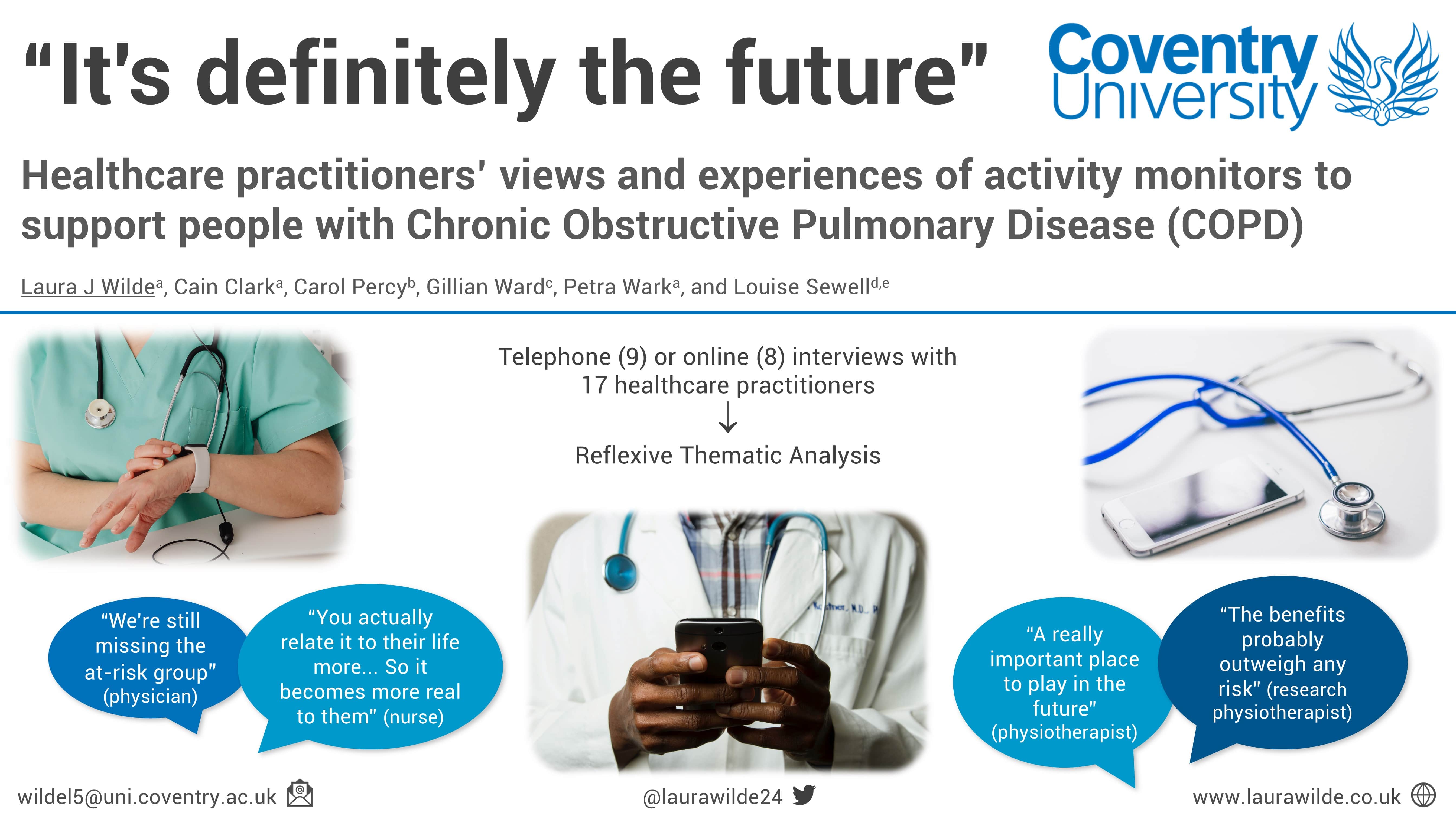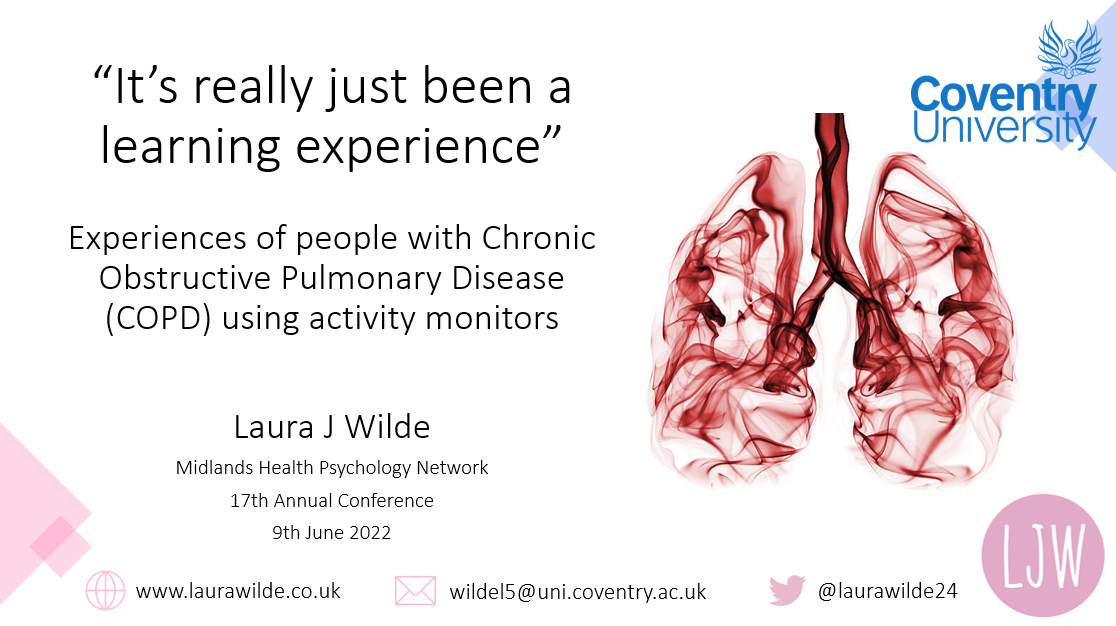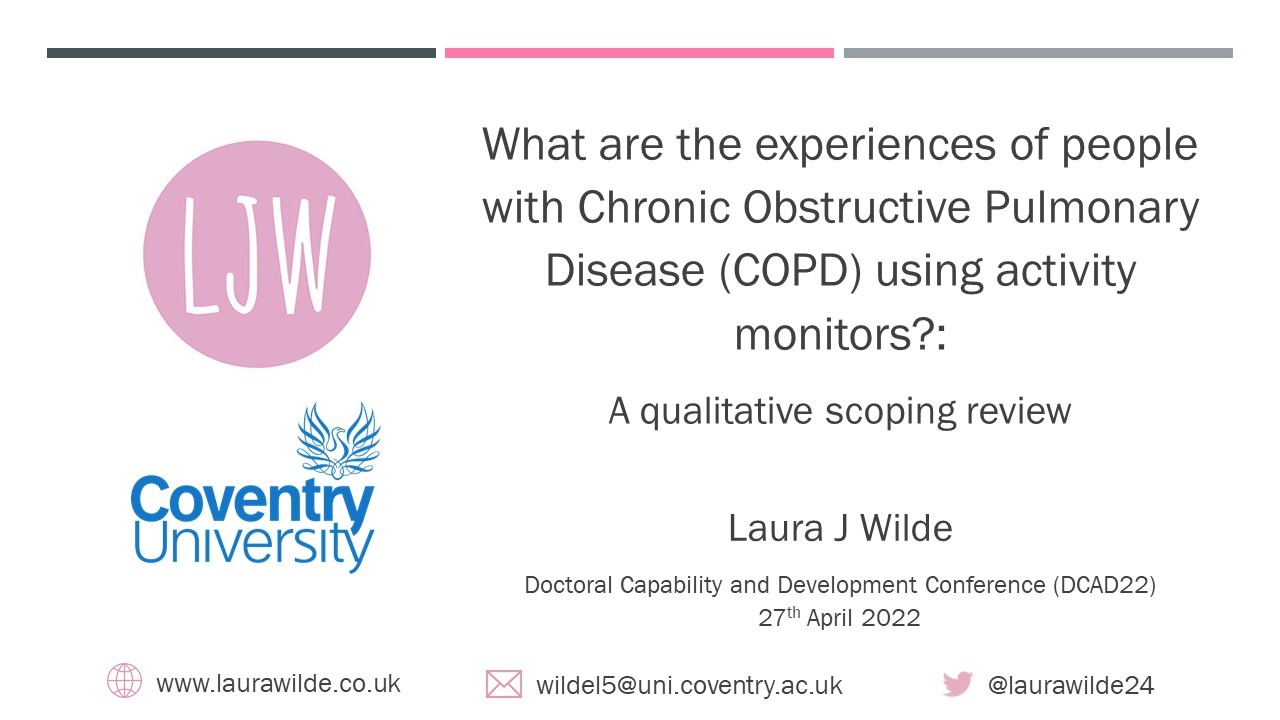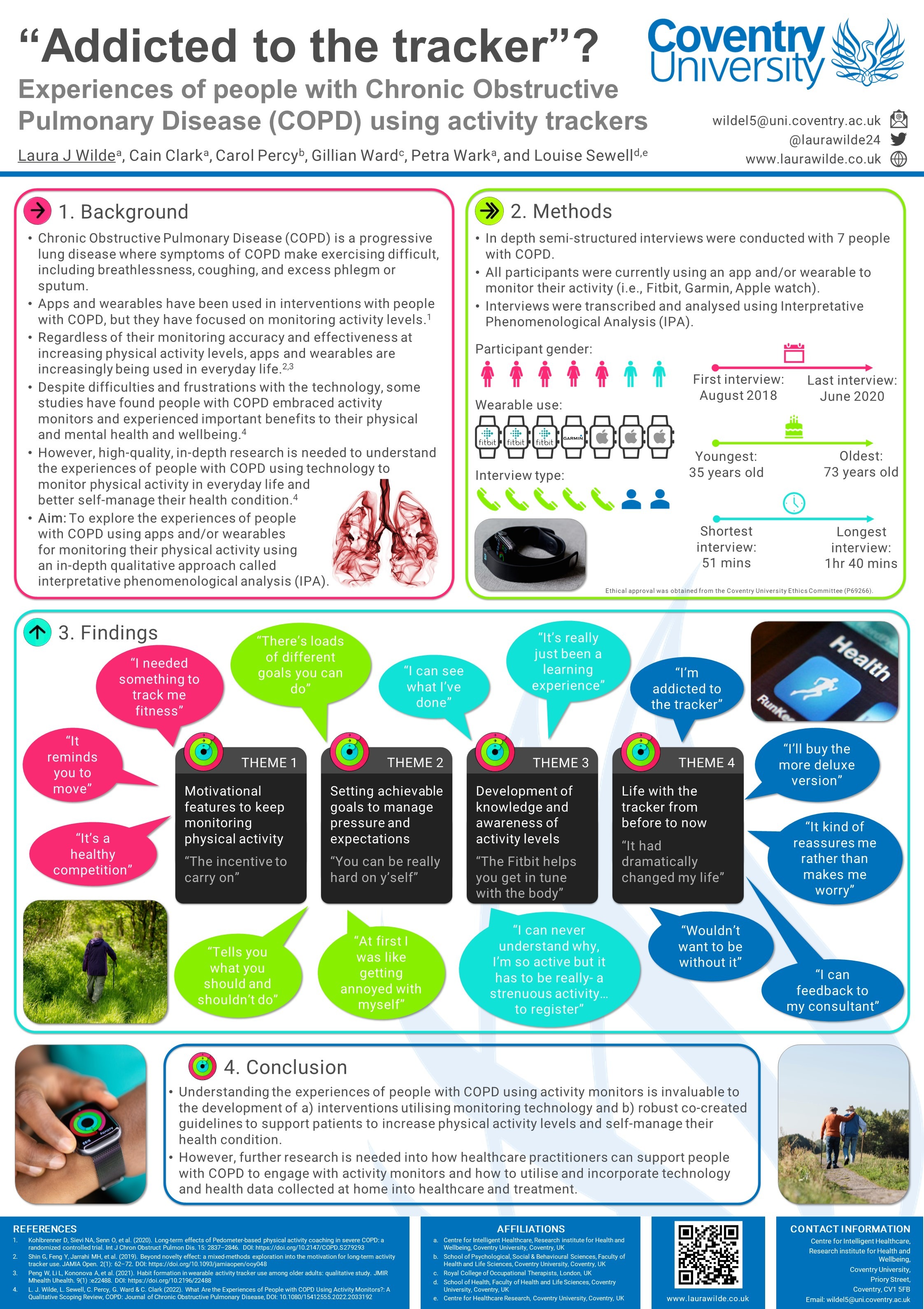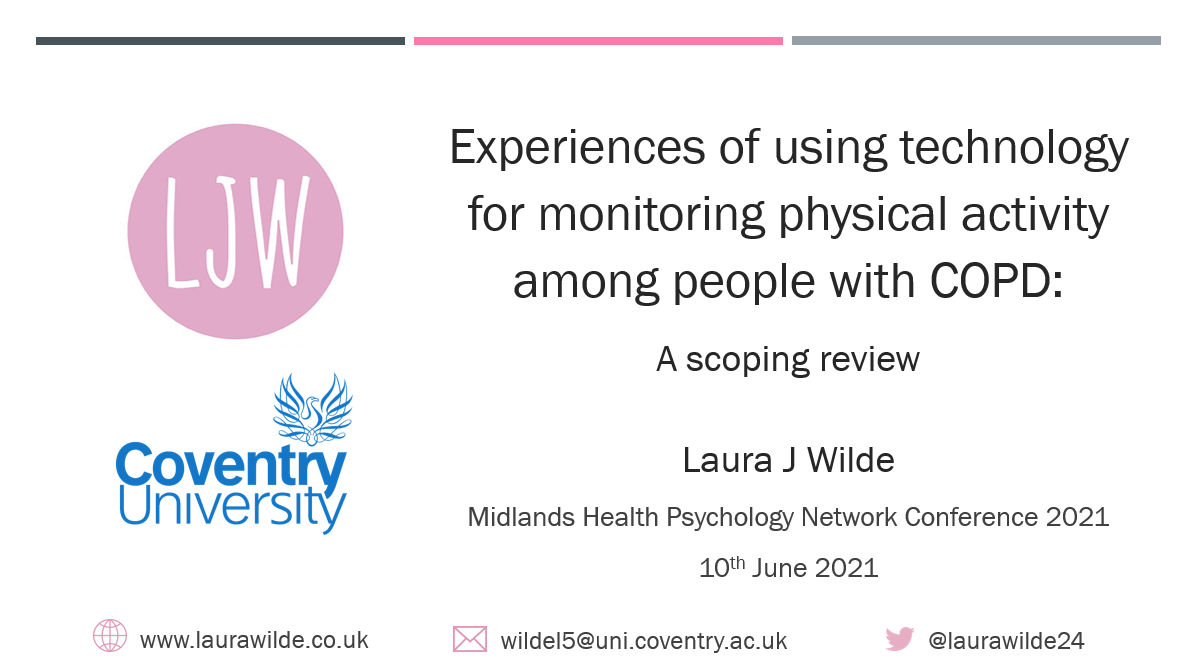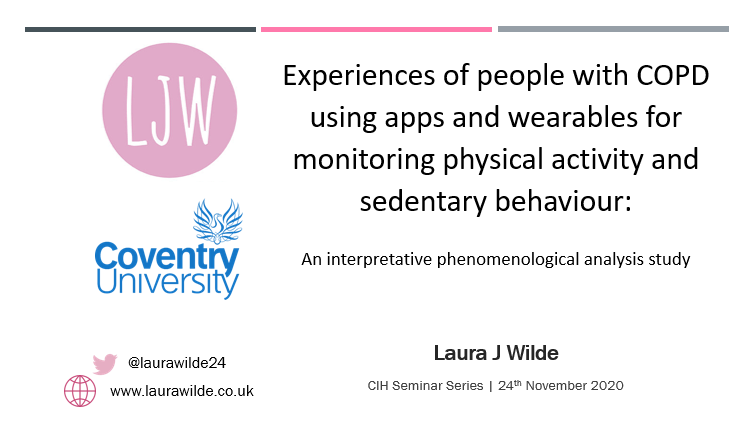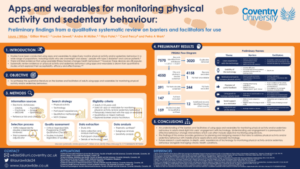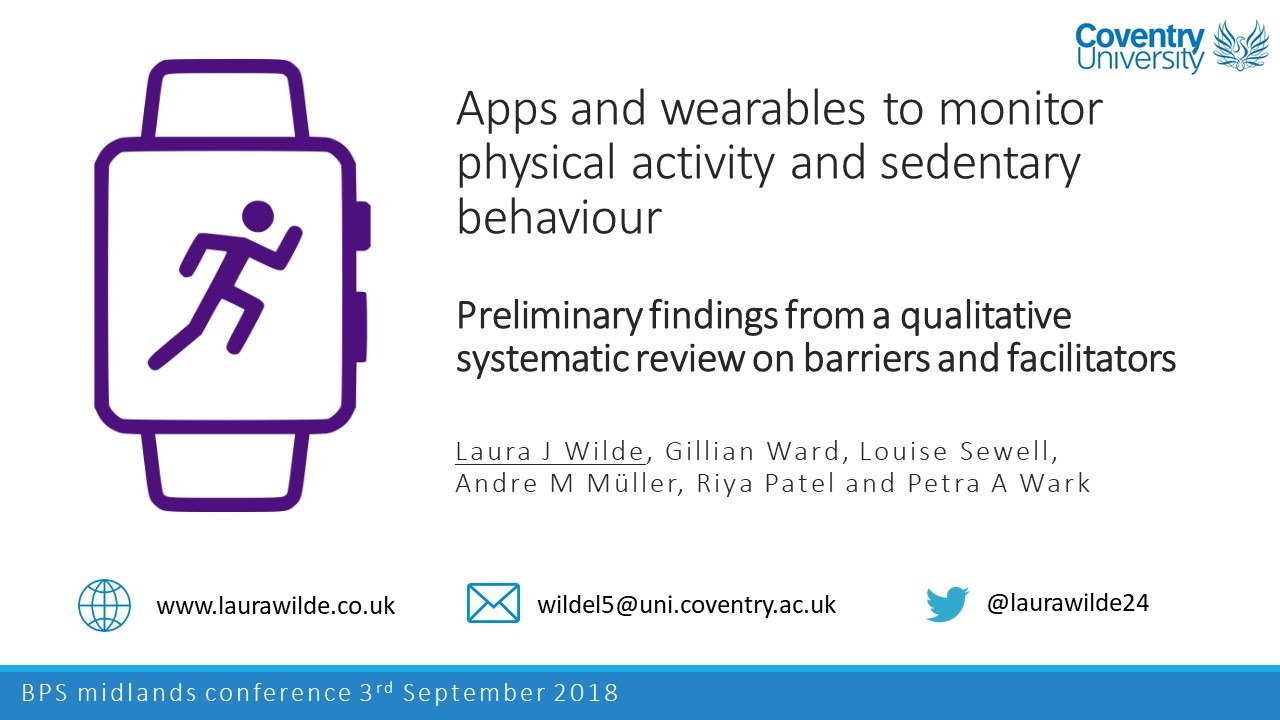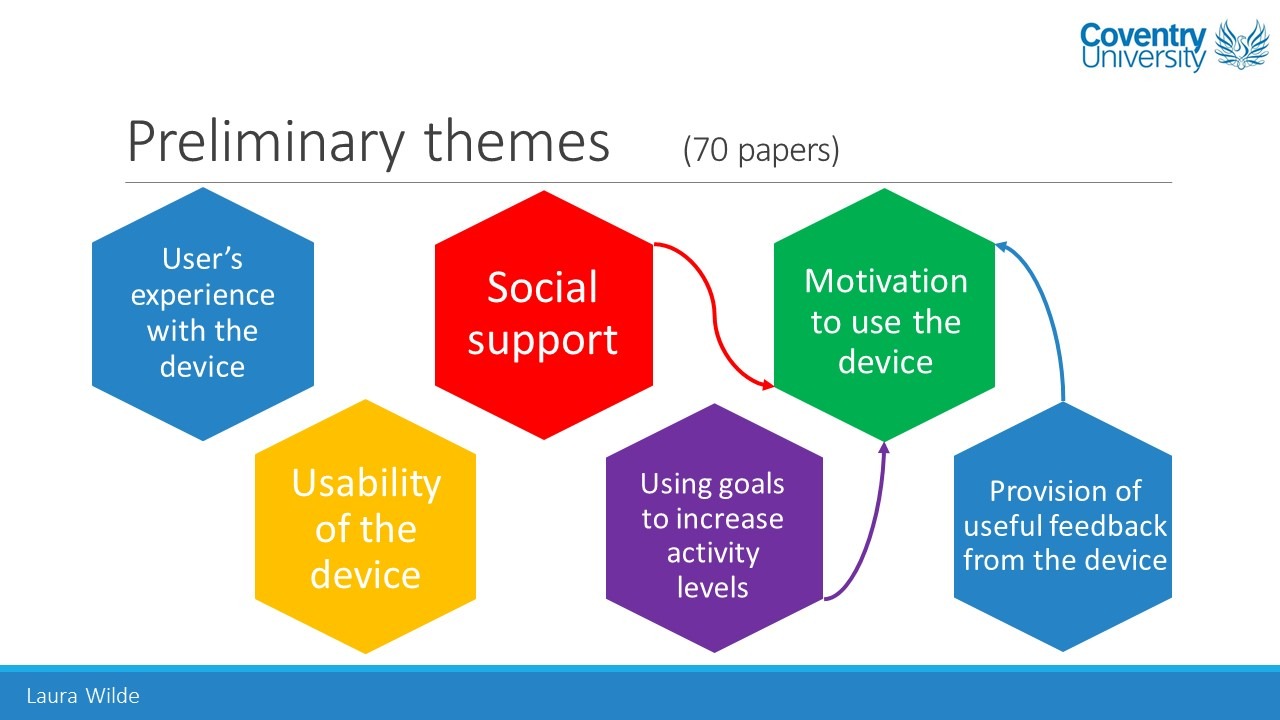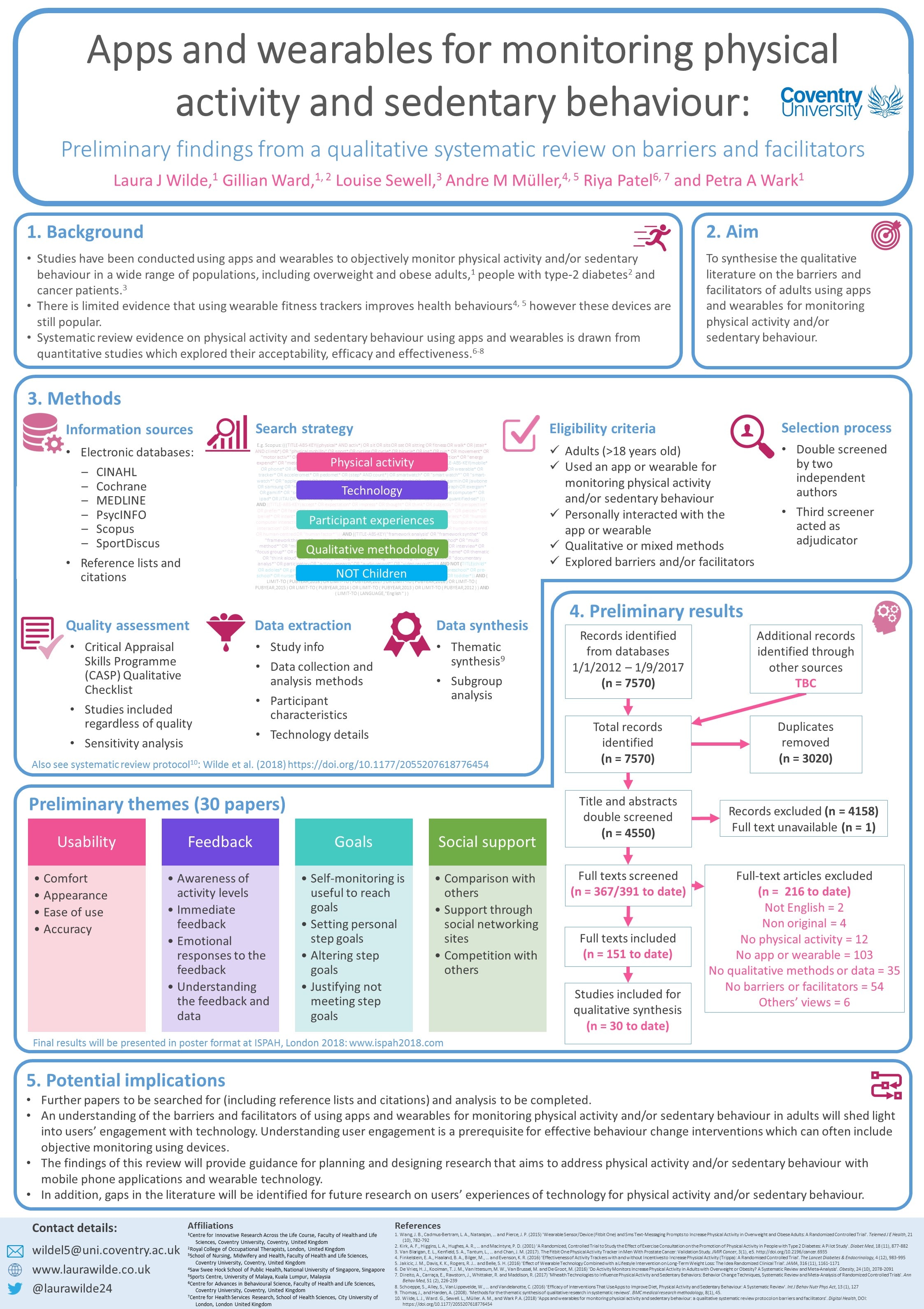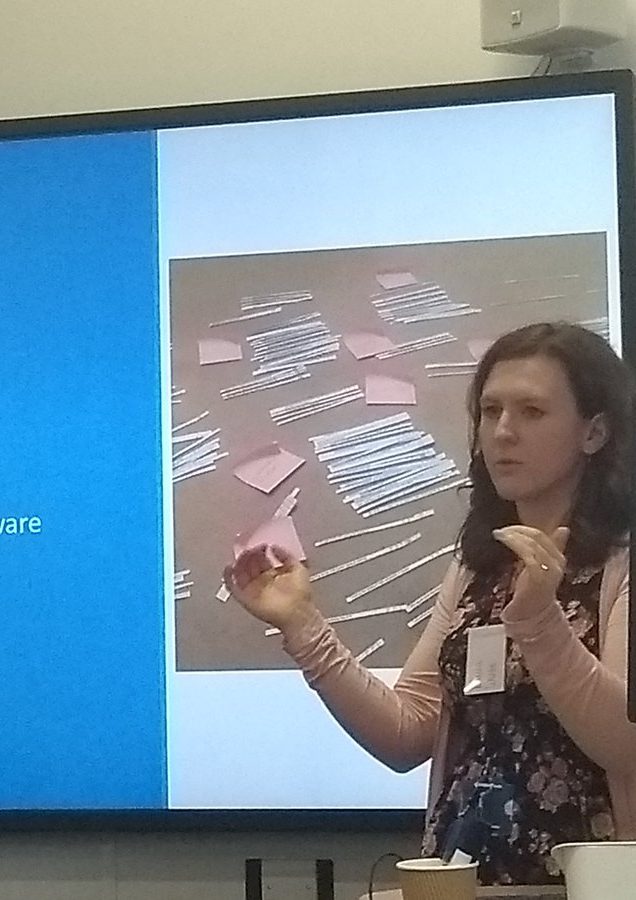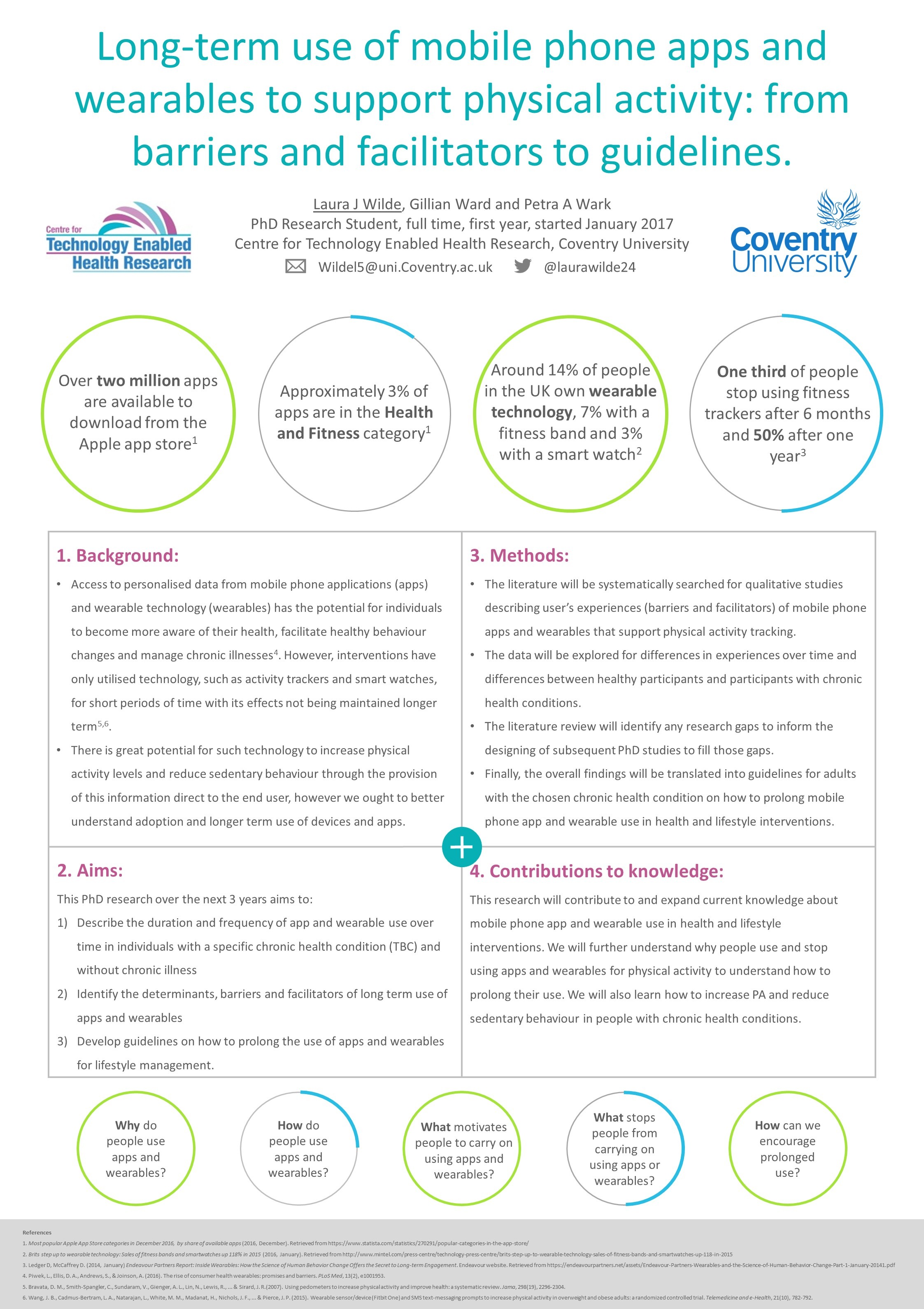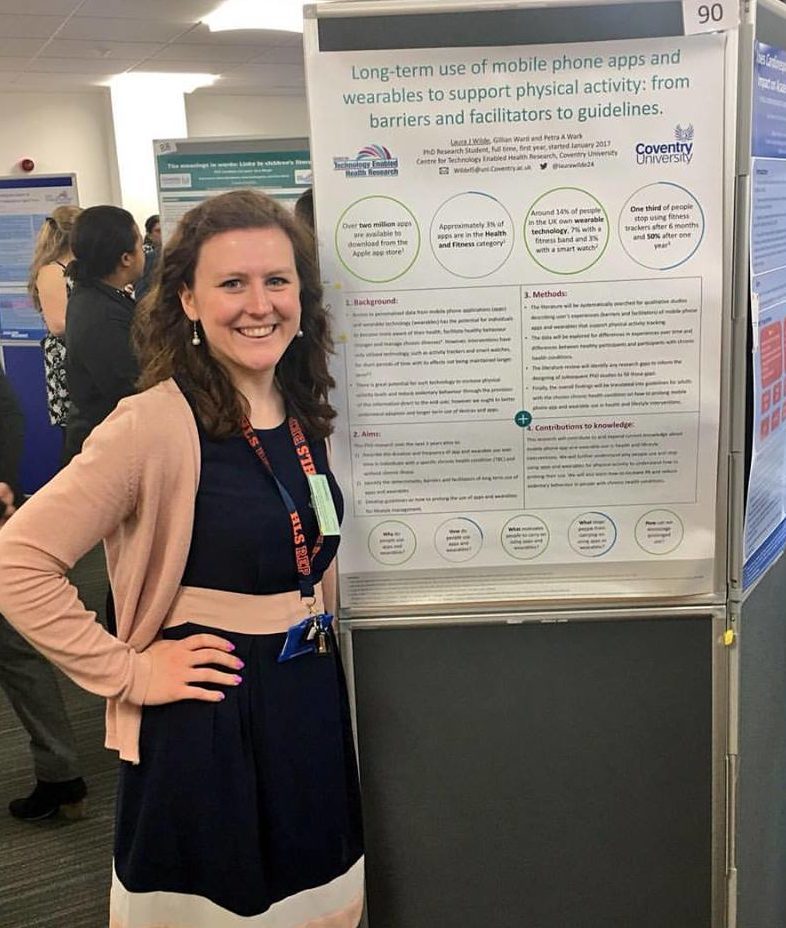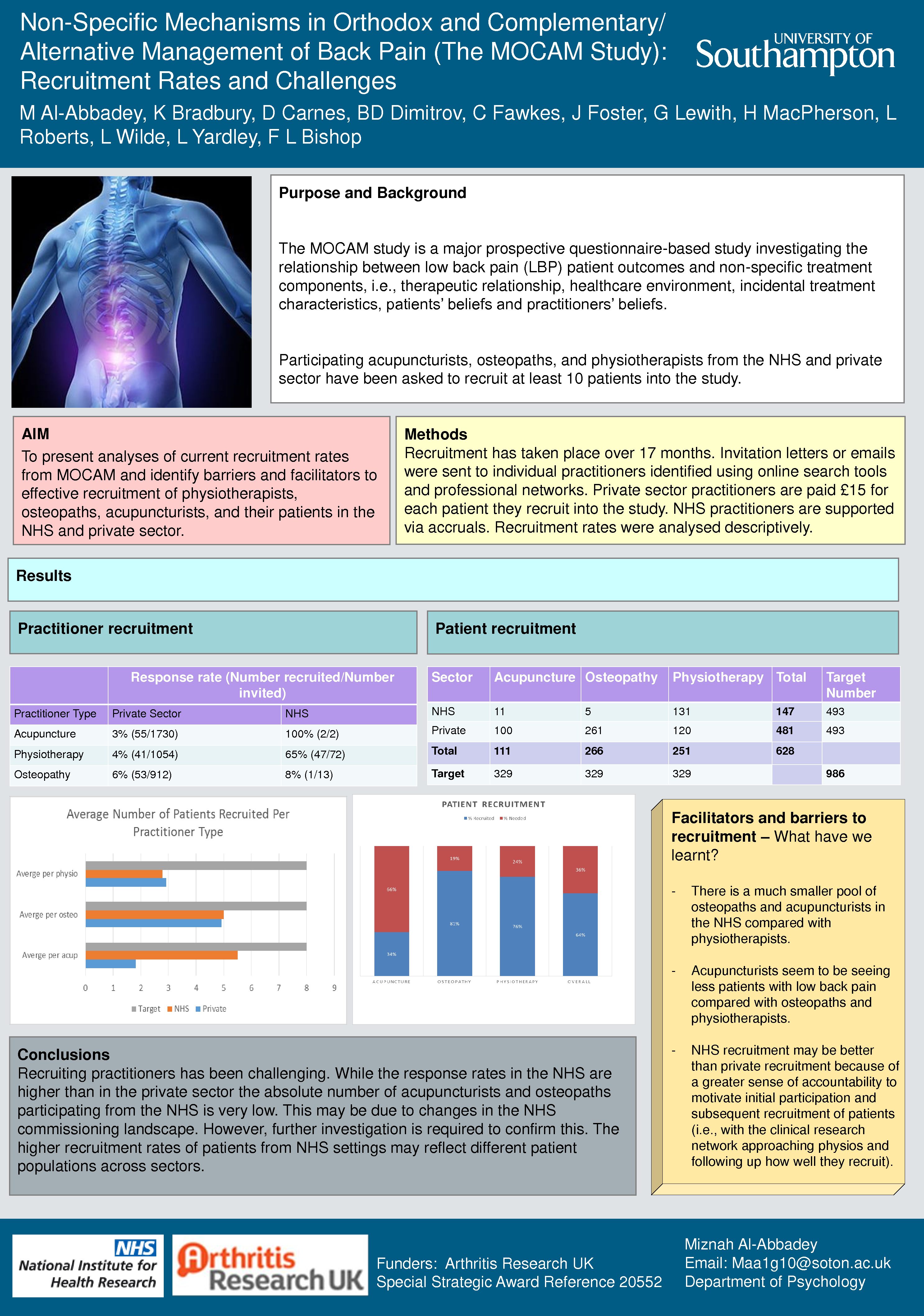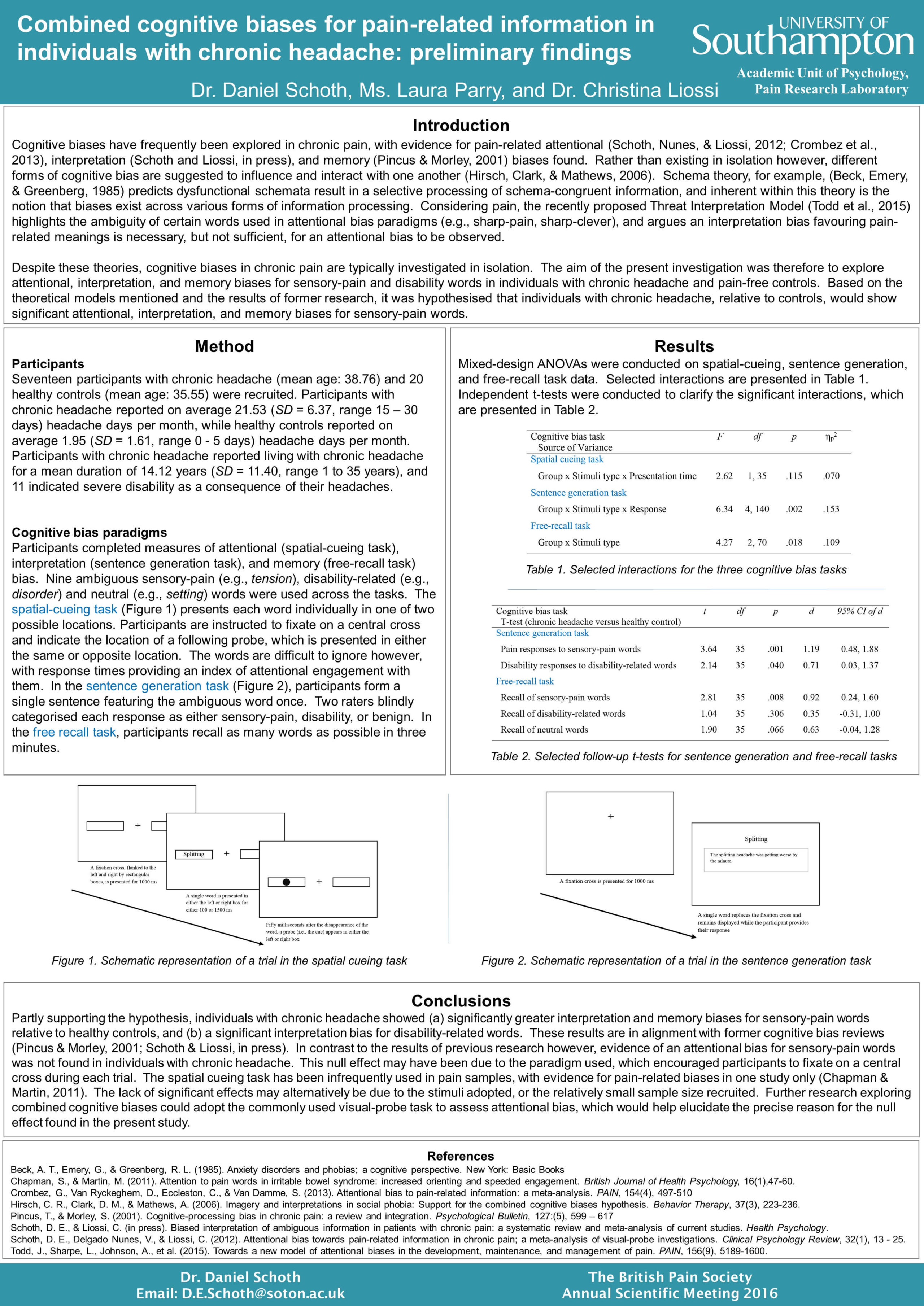Co-creating information on using smartwatches for supported self-management with people with Chronic Obstructive Pulmonary Disease (COPD) and healthcare practitioners: Online vs a face-to-face workshop
Wilde, L. J., & Holliday, N. (8th September 2023).
Poster presentation. Oral Presentation. Festival of Psychology in the Midlands, British Psychological Society, Birmingham, UK.
“It’s really just been a learning experience”: A qualitative study to explore the experiences of people with Chronic Obstructive Pulmonary Disease (COPD) using activity monitors.
Wilde, L. J., Clark, C., Percy, C., Ward, G., Wark, P. A., & Sewell, L. (25th November 2022).
Poster presentation. British Thoracic Society Winter Meeting 2022, London, UK. http://dx.doi.org/10.1136/thorax-2022-BTSabstracts.306
“It's definitely the future”: Healthcare practitioners’ views and experiences of activity monitors to support people with Chronic Obstructive Pulmonary Disease (COPD)
Wilde, L. J., Clark, C., Percy, C., Ward, G., Wark, P. A., & Sewell, L. (25th November 2022).
Poster presentation. British Thoracic Society Winter Meeting 2022, London, UK. http://dx.doi.org/10.1136/thorax-2022-BTSabstracts.307
“It’s really just been a learning experience”: Experiences of people with Chronic Obstructive Pulmonary Disease (COPD) using activity monitors
Online Oral Presentation. Midlands Health Psychology Network 17th Annual Conference. DOI: 10.13140/RG.2.2.19457.33121
What are the experiences of people with Chronic Obstructive Pulmonary Disease (COPD) using activity monitors? A qualitative scoping review
Oral Presentation. Doctoral Capability and Development Conference (DCAD22),
Coventry University.
“Addicted to the tracker”? Experiences of people with Chronic Obstructive Pulmonary Disease (COPD) using activity trackers
Poster Presentation. Doctoral Capability and Development Conference (DCAD22),
Coventry University.
“Addicted to the tracker”?: Experiences of people with Chronic Obstructive Pulmonary Disease (COPD) using activity trackers
Poster Presentation. Centre for Intelligent Healthcare PGR mini-symposium.
Journey into the Global RECHARGE project: Successes and challenges of global collaborations
Jayamaha, A.R., Perera C. P., Pina, I, & Wilde. L. (28th July 2021)
Online presentation. Virtual seminar series: Working with partners in LMIC to address real world challenges, University of Leicester, Leicester, UK.
Experiences of using technology for monitoring physical activity among people with COPD: A scoping review
Online Oral Presentation. Midlands Health Psychology Network 16th Annual Conference: Applied Health Psychology in a Climate of Change
Apps and wearables to monitor physical activity and sedentary behaviour: Preliminary finding from a qualitative systematic review protocol on barriers and facilitators to use
Poster Presentation. The 7th International Society for Physical Activity and Health Congress (ISPAH)
Apps and wearables to monitor physical activity and sedentary behaviour: Preliminary finding from a qualitative systematic review protocol on barriers and facilitators
Wilde, L. J., Ward, G., Sewell, L., Müller, A. M., Patel, R. & Wark, P. W. (3rd September 2018)
Oral presentation. The 1st British Psychological Society Midlands Conference 2018, Birmingham, UK.
Objectives: To synthesise the qualitative literature on the barriers and facilitators of using apps and wearables for monitoring physical activity (PA) and/or sedentary behaviour (SB). Design: This systematic review is registered with the International Prospective Register of Systematic Reviews (CRD42017070194)...
Apps and wearables to monitor physical activity and sedentary behaviour: Preliminary finding from a qualitative systematic review protocol on barriers and facilitators
Wilde, L. J., Ward, G., Sewell, L., Müller, A. M., Patel, R. & Wark, P. W. (24-26th April 2018)
Poster Presentation. International Society of Behavioral Nutrition and Physical Activity (ISNBPA) 2015: Advancing Behaviour Change Science, Hong Kong, China.
Abstract: Monitoring physical activity (PA) and sedentary behaviour (SB) using mobile phone applications (apps) and wearable technology (wearables) may improve PA and SB. So far systematic review evidence summarises quantitative studies investigating the acceptability, efficacy and effectiveness of apps and wearables related to physical activity and sedentary behaviour...
Apps and wearables to monitor physical activity and sedentary behaviour: Preliminary finding from a qualitative systematic review protocol on barriers and facilitators
Wilde, L. J., Ward, G., Sewell, L., Müller, A. M., Patel, R. & Wark, P. W. (24-26th April 2018)
Oral Presentation. Doctoral Capability and Development Conference 2018, Coventry, UK.
Abstract: Monitoring physical and sedentary behaviour using mobile phone applications (apps) and wearable technology (wearables) may improve these health behaviours. So far evidence summarises quantitative studies investigating the acceptability, efficacy and effectiveness of apps and wearables related to PA and SB. Qualitative research can provide an in-depth insight into the barriers...
Long-term use of mobile phone apps and wearables to support physical activity: from barriers and facilitators to guidelines
Wilde, L. J., Ward, G., & Wark, P. A. (24-25th May 2017). Poster and 1-minute madness presentation. GetAMoveOn Network+ 1st Annual Symposium: Leveraging technology to enable mobility and transform health, London, UK
Abstract: There are over two million mobile phone applications (apps) available to download from the Apple app store, with approximately 3% in the Health and Fitness category. Access to personalised data from apps and wearable technology (wearables) has the potential for individuals to become more aware of their health, facilitate healthy behaviour changes and manage chronic illnesses...
Long-term use of mobile phone apps and wearables to support physical activity: from barriers and facilitators to guidelines
Wilde, L. J., Ward, G., & Wark, P. A. ( 27th April 2017). Conference Poster. Health and Life Sciences Annual Conference 2017 ‘Creative Partnerships’, Coventry University, Coventry, UK
Abstract: There are over two million mobile phone applications (apps) available to download from the Apple app store, with approximately 3% in the Health and Fitness category. Access to personalised data from apps and wearable technology (wearables) has the potential for individuals to become more aware of their health, facilitate healthy behaviour changes and manage chronic illnesses...
Non-specific mechanisms in orthodox and complementary/alternative management of back pain (The MOCAM Study): recruitment rates and challenges
Al-Abbadey, M., Bradbury, K., Carnes, D., Dimitrov, B. D., Fawkes, C., Foster, J., Lewith, G., MacPherson, H., Roberts, L., Wilde, L., Yardley, L., & Bishop, F. L. (November 2016). Conference Poster. The Society of Back Pain Research, Preston, UK.
Abstract: Purpose and Background. The MOCAM study is a major prospective questionnaire-based study investigating the relationship between low back pain (LBP) patient outcomes and non-specific treatment components, i.e., therapeutic relationship, healthcare environment, incidental treatment characteristics, patients' beliefs and practitioners' beliefs...
Combined cognitive biases for pain-related information in individuals with chronic headache: preliminary findings
Schoth, D. E., Parry, L., & Liossi, C. (10-12th May 2016). Conference Poster. British Pain Society Annual Scientific Meeting 2016, Harrogate, UK.
Abstract: Cognitive biases have frequently been explored in chronic pain, with evidence for pain-related attentional, interpretation, and memory biases found. Rather than existing in isolation however, different forms of cognitive bias are suggested to influence and interact with one another...
Get in touch...
If you have any questions about my presentations...

